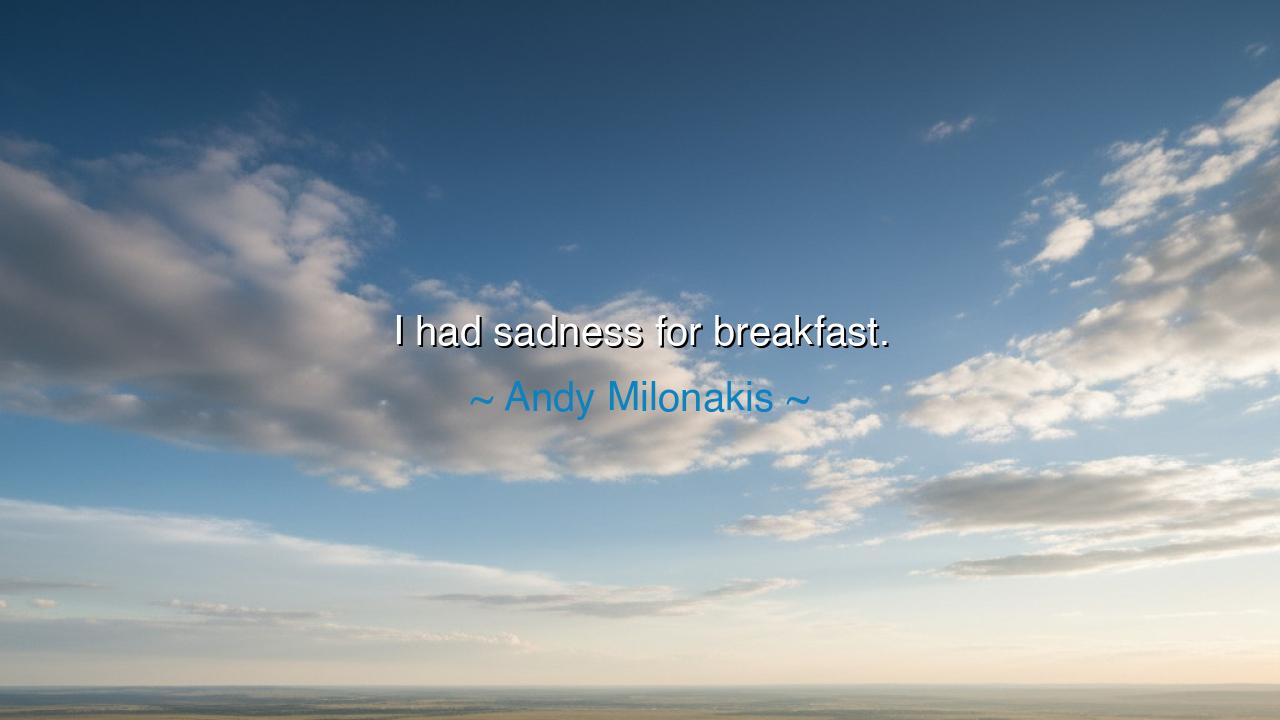
I had sadness for breakfast.






In the haunting and self-aware words of Andy Milonakis, there lies a truth wrapped in humor and melancholy: “I had sadness for breakfast.” Though brief and simple, this phrase carries the weight of human experience—the quiet acknowledgment that sometimes sorrow greets us before the day has even begun. It is the confession of one who wakes not to sunlight, but to the heaviness of the heart. And yet, in speaking it aloud, there is power. For to name one’s sadness is the first act of understanding it; to acknowledge pain is the first step toward transformation.
Andy Milonakis, a comedian known for his absurd humor and childlike playfulness, has long embodied the tension between laughter and loneliness. His quote, though delivered with a tone of irony, reveals a deeper emotional truth: that even those who make others laugh often wrestle with darkness within. The words “sadness for breakfast” conjure an image both vivid and universal—the taste of grief at the start of a new day, the weight of unspoken sorrow carried like a silent companion. Yet beneath this image, there is resilience. To eat one’s sadness is to survive it. To face it before the day begins is to refuse to run from it.
The ancients, too, understood this duality—the way sorrow nourishes the soul even as it wounds it. The philosopher Seneca, writing to his friends in exile, said, “The mind that has suffered learns to be strong.” Likewise, Buddha taught that suffering is not merely a burden but a teacher, the root of compassion and awareness. Andy Milonakis’s words, though born of modern wit, carry the same ancient echo: that sadness, when faced honestly, becomes a kind of sustenance. It does not destroy the soul but deepens it. Each morning of sorrow strengthens the heart’s endurance, each taste of pain refines one’s gratitude for joy.
Consider the story of Abraham Lincoln, who bore the weight of grief and melancholy through much of his life. Friends described him as having “a constitution prone to sadness,” and yet, from that sadness grew wisdom, empathy, and greatness. During the Civil War, when the fate of his nation trembled, Lincoln wrote, “I am now the most miserable man living… yet somehow, I hope to be better for it.” Like Milonakis’s modern lament, his sorrow was not weakness but awakening. He, too, had “sadness for breakfast,” and yet he rose to guide others toward the light. Through pain, he learned mercy; through grief, he learned greatness.
In truth, sadness is not the enemy of life—it is its measure. Those who never taste sorrow also never taste depth. Joy without sorrow is like light without shadow—it blinds rather than illuminates. Milonakis, perhaps without intent, speaks to this eternal paradox: that sorrow is part of the human diet. To deny it is to starve the soul of understanding. When we accept sadness as part of our daily bread, we no longer fear it. We chew it slowly, learn its flavor, and find within it the minerals of wisdom and compassion.
From this reflection arises a timeless lesson: embrace your sadness, but do not dwell forever within it. To “have sadness for breakfast” is to face the day honestly—to acknowledge your pain and still choose to move forward. But it is not meant to be your supper. Let sorrow begin your morning if it must, but let hope end your day. Allow your emotions to flow like seasons, each with its purpose. To feel deeply is not to be broken—it is to be human.
So, O listener, when the morning greets you with heaviness, do not curse it. Sit with your sadness as one sits with an old friend. Eat your sorrow, but do not let it consume you. Know that in the act of feeling lies the power of renewal. For as Andy Milonakis reminds us in his strange yet soulful way, even the saddest morning can nourish the spirit that dares to face it. And when you rise from that table of grief, having tasted your tears and survived them, the day ahead will be yours—richer, deeper, and more alive than before.






AAdministratorAdministrator
Welcome, honored guests. Please leave a comment, we will respond soon